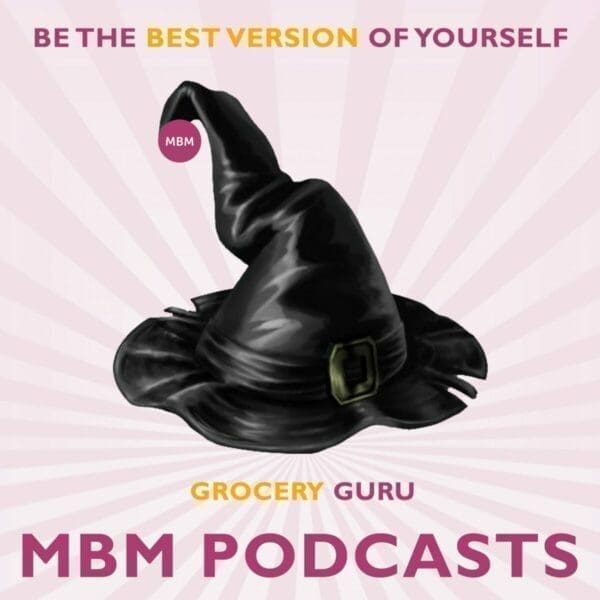Podcast: Play in new window | Download
Grocery Guru Ep14: Range Reviews and Resets
Join Andrew Grant and Darren A. Smith in the fourteenth episode of Grocery Guru: Discussing Range Reviews and Range Resets.
You Can Read the Full Range Reviews and Resets Episode Transcript Below:
Darren A. Smith:
Welcome to episode 14 of the Grocery Guru with Andrew Grant. Andrew, how are you?
Andrew Grant:
Hi, Darren. Good, good. Thank you. You?
Darren A. Smith:
Yeah, I’m good, I’m good. Looks like you’re at your mum’s, am I guessing?
Andrew Grant:
I am at the homely palatial pile.
Darren A. Smith:
Very nice. Very nice. All right, looks lovely. This week I think we’re talking about range reviews, range resets, that sort of thing. That’s what we discussed?
Andrew Grant:
Yeah, I think we said last week, not a lot hot happening out there. About the only bit of newsworthy stuff to come out is Morrisons have had a virtual supplier conference and have announced a major category reset. What I found quite funny actually is some of the learned publications out there picked up the fact that it’s a 170-category range review.

Darren A. Smith:
Wow.
Andrew Grant:
But published it as Morrisons to change 170 products. Yeah.
Darren A. Smith:
Well, that’s not many, so that shouldn’t take long.
Andrew Grant:
Might take them about 12 minutes, I reckon. Yeah. But no, it’s 170 categories, full-on range reset by the sounds of it and utilizing their new Morrisons Edge shopper insight technology.
Darren A. Smith:
And is this their hookup with IRI, am I guessing?
Andrew Grant:
Yeah, with IRI.
Darren A. Smith:
Okay. So a crazy time to be doing a range review, range reset?
Andrew Grant:
Well, yeah, exactly. That was my first thought. We don’t know what the new normal is. So they’re going to be looking at a year’s worth of data when… just take a few categories. People haven’t really bought any sandwiches for lunch. People haven’t been doing meal deals. Everybody’s been baking at home and cooking at home. So ready meals sales probably aren’t reflective of whatever the new normal is. So I think it quite, quite difficult to do a range review when the world’s been turned upside down. Why the timing now, is slightly bizarre to me.
Darren A. Smith:
I don’t know. I mean, it’s a topsy-turvy time obviously to do it, and you’re basing it on data that may then change as shopper habits change, we come out of lockdown, blah, blah, blah. Is it a brave move to be doing it? I think not is my suspicion. Not a brave move.
Andrew Grant:
I suppose, as long as they put a common-sense rule over it. But obviously, we don’t know what data will come out, but you can sort of, with some of the macro trends we’ve talked about over the last few months, you could almost imagine a situation where a whole aisle of flour, you de-list ready meals, you take out front of the store and fill it with masks. That ain’t going to be the new normal back in, hopefully, in May, June, July.
Darren A. Smith:
You’re right, it’s not. And I think with what we could both credit our friends in Bradford with more intelligence, and of course, they’re not going to put a whole aisle of masks in, but it comes down to the nitty-gritty, doesn’t it? Are they going to extend baking by 20% and then try and change it again in June when they go, “Hold on, we’re now not all baking”?
Andrew Grant:
Yeah exactly. So it will be interesting. And I guess for the suppliers out there, our clients, it’s going to be quite a challenging range reset for them to go through. I guess our message is we’ve got a lot of experience of this. And obviously, the inevitable negotiations that will come to fruit from the winners and the losers being put under pressure. So I guess, yeah. I guess the message of today’s webinar is that we’re here to help if there’s any Morrisons supplier out there caught up in this range reset. Quite important, I think, that they spend the commensurate amount of time on it because it’s going to be a weird one.
Darren A. Smith:
It is. And also not forgetting we’ve got our new man in the office, Mark White. So GSCOP is looking down with a fresh lens at de-lists, which Morrisons could come a cropper on if they’re not careful with those. I’m sure they are.
Andrew Grant:
Well yeah no, as always, yeah. There’s a new adjudicator there, I think we’ve said way back in an early one of these. Yeah. He will want to make his mark. What is it, the famous first hundred days?
Darren A. Smith:
Yes, yes.
Andrew Grant:
He must be coming close to that, so I’m sure he’ll want to make his mark. But we’ve seen that all the signed-up retailers under GSCOP, they do pretty much play by the rules.
Darren A. Smith:
Yes. Yes. And we’ve got the Code Confident pack, which was launched a couple of weeks ago by Mark, which we’re having a look at. Yep, thumbs up to that. And then that made me think about Biden’s first hundred days. A quick note to him. I think he’s made some cracking decisions of basically overturning everything that Trump did.
Andrew Grant:
Yeah, yeah. Probably not a difficult first hundred days for him, but probably outside our remit, I think, Darren.
Darren A. Smith:
I think so. So let’s come back to range reviews. Your experience, what would you tell the people watching this on range reviews? I’ve got a couple of things I’d share, but what would you say has been through probably hundreds?
Andrew Grant:
You’ve just got to immerse yourself in the data and come up with the… Well, stick with the shopper, as we’ve always said. The shopper is king. Start with the shopper and work back. I guess if you’re a supplier or a brand that gets genuinely bad news, in the sense that your products are no longer shopper relevant, then you’re going to have to do some very, very deep naval-gazing. Because otherwise you’ll just end up basically spending money to keep listed, which might work in the short term, may buy you the time to sort of re-strategize in the medium term.
But other than that, suppliers need to be all over the numbers and really understand why, if we’re talking Morrisons, why Morrisons shoppers buy their products. And build themselves an armoury of insights, so when the inevitable conversation comes along, be it good or bad, it will inevitably be attached to money. They can have a very forceful and logical argument based on Morrison’s own shopper behaviours.
Darren A. Smith:
Yeah, I like that. My own experience of being on the sidelines and watching some reviews is that they don’t start with an objective. So the objective should be we’re going to make X more money. We’re going to attract 10% more clients. And what’s your friend’s phrase? WOP, FOP and PEN?
Andrew Grant:
Yeah. Yeah.
Darren A. Smith:
Just explain that so these guys know what we’re talking about.
Andrew Grant:
It’s very simple. The only three ways you can add value to a category is to bring your shoppers in, which is penetration. The hardest one to achieve. Get customers to spend more, that’s weight of purchase, valuated purchase, or get them to buy bigger packs, volume weight of purchase. Or get them to buy more often. Get them to come in every week, rather than every fortnight, which is frequency.
Darren A. Smith:
Lovely, I like that. WOP, FOP and PEN. That’s right, isn’t it?
Andrew Grant:
WOP, FOP, PEN. Yeah.
Darren A. Smith:
So you either get more shoppers in, you get them to buy more, or you get them to buy more often. And-
Andrew Grant:
Or ideally all three.
Darren A. Smith:
… or all three. And our suggestion should be that your range review would start with an objective of one of those. Now typically when you move one of those styles, one of the others goes back down, but overall you should add to your category 3%, 5%, we’ve going to get 10,000 more customers, 10,000 more shoppers.
Andrew Grant:
Yeah and we’ve got one of the dynamics of this pandemic is frequency has dropped considerably. So people have gone back to a bi-weekly or even a monthly shop. As we said right at the start this morning, people aren’t popping in every day for lunch and picking up their dinner, because they’re stuck at home and they’re probably getting the delivery. We talked about home deliveries a lot. Again, a home delivery truck every two weeks. So frequency has dropped dramatically. But I remember Tesco’s financial statement, the weight of purchase has rocketed.
Darren A. Smith:
Yeah, that makes sense.
Andrew Grant:
And particularly in areas like beers, wines, and spirits, obviously, because there are no pubs to go to.
Darren A. Smith:
Well, how else do we get through lockdown? One last piece for me on range reviews is that I see suppliers and supermarkets treating every SKU the same in terms of availability. But if we understand that this SKU is substitutable, then maybe this SKU will be bought in its place. We don’t need to drive 100% availability of this one because they’ll buy this one. You take Tabasco. 100% availability, of course, because you’re not going to buy anything else. But there are other SKU’s that’ll be more substitutable. So one of the things I would advocate is an availability strategy along with the weight.
Andrew Grant:
Well, yeah, it’s the basic building blocks of category management. Complementarity and substitutability, and it’s where if you are a product that is not substitutable, and I’d say something like HP sauce. If you want, people buy HP sauce because it’s HP sauce. A few people may buy their own label, but pretty much it’s a non-substitutable product.
Darren A. Smith:
Agreed.
Andrew Grant:
So you can build yourself a very strong argument for being in a category if people will walk away if that particular product isn’t available. But then complementarity is very important. If you’re selling jam, you probably have to sell spreads and bread. So again, you can create yourself strong category arguments based on you’re either not substitutable or you’re highly complementary to some of the major basket items.
Darren A. Smith:
Good, like it. I’m going to leave you with a question, see if you can answer it. HP, what does it stand for?
Andrew Grant:
Houses of Parliament, isn’t it? It was on the labels.
Darren A. Smith:
Very good, okay.
Andrew Grant:
Used to be on the labels back in the day.
Darren A. Smith:
I’ll catch you out next time. Andrew for this week, thank you very much. I’ll press stop. Take care.
Andrew Grant:
Okay, take care. Bye.



